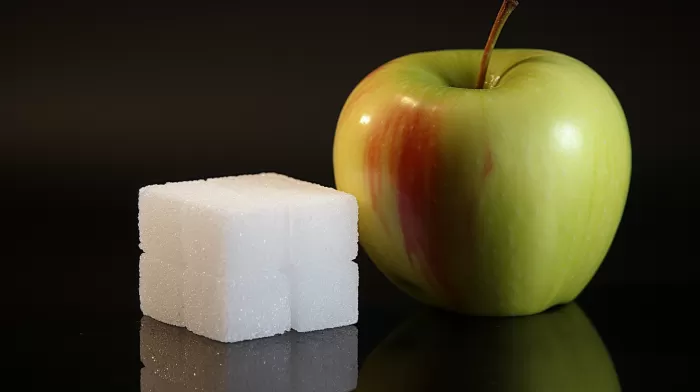Fructose and sucrose are both sugars and are both carbohydrates. Fructose is a monosaccharide, or simple sugar, the basic unit of a carbohydrate molecule. Sucrose is a polysaccharide, or a long carbohydrate molecule, formed when monosaccharides link.
Fructose and sucrose have distinct chemical properties. Fructose is most often consumed from the fruit we eat, which is why it is often called fruit sugar. Sucrose, on the other hand, is the white crystal sugar we buy and consume: table sugar.
Your body doesn’t need to break down fructose before it’s absorbed through the intestines. However, your body needs a digestive enzyme called sucrase to digest, or break down, sucrose. Because of their contrasting chemical makeups, fructose doesn’t require the body to produce as heavy an insulin release as it needs for sucrose. Sucrose signals the pancreas to release insulin as a message to the body’s cells to absorb blood sugar.
Counterintuitive
You might assume that because fructose is natural and doesn’t require as much of an insulin response, it’s a healthier nutrient than sucrose and that fruit sugar is better for you than table sugar. However, a recent study at Yale University, published in the Journal of the American Medical Association (JAMA), indicates otherwise. Researchers found that fructose is more closely associated with obesity than sucrose.
Fructose And Glucose
Researchers at Yale titled their report “Effects of fructose vs glucose on regional cerebral blood flow in brain regions involved with appetite and reward pathways.” The study involved 20 healthy adults who underwent two MRI sessions at Yale. Each imaging session followed consumption of either a fructose-sweetened or a glucose-sweetened beverage. Participants didn’t know which sweetener was in their beverage.
The study measured the changes in hypothalamic regional cerebral blood flow (CBF) after consumption of each drink. A secondary analysis focused on whole-brain analyses to “explore regional CBF changes, functional connectivity analysis to investigate correlations between the hypothalamus and other brain region responses, and hormone responses to fructose and glucose ingestion.”
Surprising Findings
The study’s findings were unexpected:
- There was a significantly greater reduction in hypothalamic CBF after glucose versus fructose ingestion.
- Glucose ingestion (compared with baseline) increased functional connectivity between the hypothalamus and the thalamus and striatum.
- Fructose increased connectivity between the hypothalamus and thalamus but not the striatum.
- Regional CBF within the hypothalamus, thalamus, insula, anterior cingulate, and striatum (appetite and reward regions) was reduced after glucose ingestion compared with baseline.
- In contrast, fructose reduced regional CBF in the thalamus, hippocampus, posterior cingulate cortex, fusiform, and visual cortex.
- In whole-brain voxel-level analyses, there were no significant differences between direct comparisons of fructose versus glucose sessions following correction for multiple comparisons.
What That Means
The results of the Yale study may seem confusing. In essence, the researchers found that fructose affected the brain in ways more likely to lead to overeating and weight gain. This was substantiated with images of how the brain areas were affected, depending on the sweetener consumed.
The scientists point out that “increases in fructose consumption have paralleled the increasing prevalence of obesity, and high-fructose diets are thought to promote weight gain and insulin resistance.”
In other words, diets high in fruit and fruit juice and beverages and foods sweetened with fructose can lead to weight gain and insulin resistance because fructose does not leave us feeling satiated, whereas sucrose apparently does.
This study provides significant insight into what we should consume and how it can change our body chemistry. It will be interesting to see more studies on this topic in the future.



